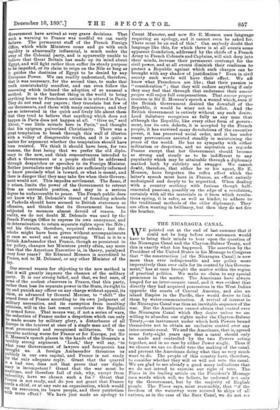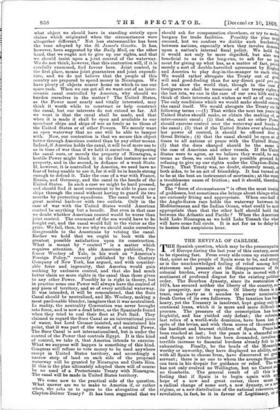THE NICARAGUA CANAL.
'WE pointed out at the end of last summer that it could not be long before our statesmen would have to bring their minds to bear upon the question of the Nicaragua Canal and the Clay ton-Bulwer Treaty, and this is exactly what has happened. The assertion by the President of the United States in his Message to Congress that " the construction [of the Nicaragua Canal] is now more than ever indispensable and our policy more imperatively than ever calls for its control by this Govern- ment," has at once brought the matter within the region. of practical politics. We make no claim to any special prescience in the matter. The Americans have always longed for an inter-oceanic canal, and it was evident that directly they had acquired possessions in the West Indies opposite the coasts of Central America, and also am island Empire in the Pacific, they would desire to link them by water-communication. A revival of interest in the Nicaragua Canal was thus an inevitable sequence of the war. But the Americans cannot obtain that control over the Nicaragua Canal which they desire unless we are willing to abandon our rights under the Clayton-Bulwer Treaty,—an instrument under which both Powers bound themselves not to obtain an exclusive control over any inter-oceanic canal. We and the Americans, that is, agreed some forty-eight years ago that a canal should only be made and controlled by the two Powers acting together, and in no case by either Power singly. Thus if we choose we can no doubt veto the making of the canal, and prevent the Americans doing what they so very mud) want to do. The people of this country have, therefore, to consider whether they will or will not veto the canal. We are glad to see already a good many indications that we do not intend to exercise our right of veto. The Times in its leading article on the President's Message. uses words which will, we believe, be endorsed not only by the Government, but by the majority of English people. The Times says, most reasonably, that "if the freedom of the waterway were secured to ships of all nations, as in the case of the Suez Canal, we do not see what object we should have in standing strictly upon claims which originated when the circumstances were altogether different." Not less statesmanlike has been the tone adopted by the St. James's Gazette. It has, however, been suggested by the Daily Mail, on the other hand, that we ought not to give up our rights, and that we should insist upon a joint control of the waterway. We do not think, however, that this contention will, if it is carefully examined, find favour here. Joint control, in the first place, means joint guarantees and joint expendi- ture, and we do not believe that the people of this country are prepared to spend money in Nicaragua. We have plenty of objects nearer home on which to use our spare cash. When we can get all we want out of an inter- oceanic canal controlled by America, why should we burden ourselves in the matter ? The United States, as the Power most nearly and vitally interested, may think it worth while to construct or help construct the canal, but our interests do not extend so far. All we want is that the canal shall be made, and that when it is made it shall be open and available to our merchant ships and ships of war as freely as to those of the United States or of other Powers. We merely want an open waterway that no one will be able to tamper with. Now, our contention is that we secure this object better through American control than by any other means. Indeed, if America holds the canal, it will be of more use to us in time of war than if we held it ourselves. Supposing the canal ours, or merely the property of Nicaragua, a hostile Power might block it in the first instance as our property, and in the second, in defiance of a weak State. If, however, it is controlled by America, we need have no fear of being unable to use it, for it will be in hands strong enough to defend it. Take the case of a war with France, Russia, and Germany, and the canal in the hands of the United States. In such a case we might be hard pressed, and should find it most convenient to be able to pass our ships through the canal without having to guard its two mouths by protecting squadrons. The canal would be a great neutral harbour with two outlets. Only in the case of war with the United States would American control be anything but a benefit. But even in that case we doubt whether American control would be worse than joint control. The command of the sea would have to be fought out, and the canal would fall to the victor as the prize. We fail, then, to see why we should make ourselves disagreeable to the Americans by vetoing the canal. Rather we hold that we ought to look with the greatest possible satisfaction upon its construction. What is meant by " control " is a matter which requires attention. An able American publicist, Pro- fessor Woolsey of Yale, in his work on "America's Foreign Policy," recently published by the Century Company of New York, has argued, and with consider- able force and ingenuity, that America would gain nothing by exclusive control, and that she had much better claim no more rights in the canal than those given to any other Power. Possibly he is right in theory, but in practice some one Power will always have the control of any piece of territory, and so of every artificial waterway. It was intended, it will be remembered, that the Suez Canal should be neutralised, and Mr. Woolsey, making a most pardonable blunder, imagines that it was neutralised. In reality, the neutrality Convention was never brought into force, and is now a dead letter, as the Spaniards found when they tried to coal their fleet at Port Said. They claimed to regard the Suez Canal as an international piece of water, but Lord Cromer insisted, and maintained his point, that it was part of the waters of a neutral Power. The Suez Canal is not internationalised, but is under the control of the Power that controls Egypt. It is this kind of control, we take it, that America intends to exercise. What we suppose will happen is something of this kind. Congress will refuse to vote money to be used anywhere except in United States territory, and accordingly a narrow strip of land on each side of the proposed waterway will be granted by Nicaragua and Costa Rica. If this is the plan ultimately adopted there will of course be no need of a Protectorate Treaty with Nicaragua. The canal will be made in United States territory.
We come now to the practical side of the question. What answer are we to make to America if, or rather when, she asks us to agree to the abrogation of the Clayton-Bulwer Treaty ? It has been suggested that we should ask for compensation elsewhere, or try to make bargain for trade facilities. Possibly the plan soli succeed, but we confess we dislike such huckster; between nations, especially when they involve denial, upon a nation's internal fiscal policy. We hold t it would not only be more dignified, but also DI beneficial to us in the long-run, to ask for no pay meat for giving up what has, as a matter of fact, pro,. merely a sort of double-barrelled agreement by Engl and America to play dog-in-the-manger to each oth We would rather abrogate the Treaty out of g will and good-feeling than for any direct quid pro 9 Let us show the world that, though in the case foreigners we shall be tenacious of our treaty rights the last iota, we can in the case of our own kith and think of their interests and wishes as well as of our e The only conditions which we would make should come the canal itself. We would abrogate the Treaty on t following terms :—(1) That within the next ten years 01 United States should make, or obtain the making of, inter-oceanic canal ; (2) that she, and no other Power should exercise control over the waterway and banks the canal ; (3) that if the United States ever abandon her power of control, it should be offered first Great Britain ; (4) that the canal should be open at times to all nations at peace with the United States (5) that the dues charged should be the same the case of American and other vessels. If the Unit States were to agree, as we believe they would, to su terms as these, we could have no possible ground f refusing to give up our rights under the Clayton-Bulw Treaty. That Treaty was, no doubt, sincerely meant, both sides, to be an act of friendship. It has turned o to be at the best an instrument of mortmain ; at the wo a troublesome cause of friction ; and it should, therefo be got rid of. The " force of circumstances " is often the most ironi of goddesses, but sometimes she brings about things whi are curiously fitting and appropriate. When one-half the Anglo-Saxon race holds the waterway between Mediterranean and the Indian Ocean, what could be mo appropriate than that the other half should hold t between the Atlantic and Pacific ? When the Ameri hold Lake Nicaragua as we hold Lake Timsah the wh will have come full circle. It is not for us to delay ha to hasten that auspicious hour.











































 Previous page
Previous page